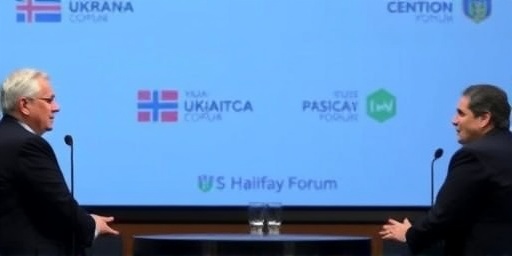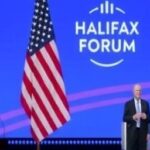In a fiery display of bipartisan unity, a group of US senators at the Halifax International Security Forum has unleashed scathing criticism against President Donald Trump‘s proposed Russia-Ukraine peace plan, labeling it a dangerous concession that would effectively reward Moscow’s invasion and erode the foundations of international law.
The forum, held in Halifax, Nova Scotia, from November 17-19, 2023, served as a global stage where world leaders and policymakers gathered to discuss pressing security challenges. But it was the US delegation’s pointed remarks that stole the spotlight, highlighting deep divisions within American politics over how to end the grinding Russia-Ukraine war. Senators from both sides of the aisle, including prominent figures like Lindsey Graham (R-SC) and Jeanne Shaheen (D-NH), argued that Trump‘s blueprint—envisioning Ukraine ceding control over Crimea and parts of the Donbas region—would not only betray Kyiv’s sovereignty but also embolden authoritarian regimes worldwide.
“This isn’t peace; it’s capitulation,” Graham declared during a panel discussion, his voice echoing through the packed auditorium. “By forcing Ukraine to surrender territory seized through sheer aggression, we’re sending a message to every dictator that might makes right.” Shaheen echoed this sentiment, adding, “The US Senate stands firm: We will not support any plan that undermines the very norms we’ve fought to uphold since World War II.”
Senators’ Bipartisan Fury Ignites at Halifax Security Forum
The Halifax International Security Forum has long been a crucible for candid debates on global threats, attracting over 200 delegates from more than 50 countries each year. This edition, themed around “Defending Democracy in an Age of Autocracy,” provided the perfect backdrop for the US senators’ outspoken rebuke. Organized by the German Marshall Fund of the United States, the event features high-level talks on everything from cyber warfare to territorial conflicts, but the Russia-Ukraine crisis dominated proceedings.
Leading the charge was a bipartisan quartet of senators: Graham, Shaheen, Marco Rubio (R-FL), and Chris Coons (D-DE). Their joint statement, released midway through the forum, pulled no punches. “President Trump‘s Russia-Ukraine peace plan represents a profound miscalculation,” it read. “It would legitimize Russia’s illegal annexation of Ukrainian land, weakening NATO’s resolve and inviting further aggression from the Kremlin.” The senators referenced recent intelligence reports showing Russian forces advancing in eastern Ukraine, with over 500,000 troops deployed since the full-scale invasion began in February 2022.
Statistics underscore the stakes. According to the United Nations, the war has displaced more than 6.5 million Ukrainians and caused an estimated 10,000 civilian deaths. The senators argued that conceding territory now would demoralize Ukraine’s defenders, who have reclaimed swaths of land in counteroffensives like the 2022 Kharkiv operation. Rubio, known for his hawkish stance on foreign policy, emphasized during a Q&A session, “We’ve invested $75 billion in aid to Ukraine—not to hand Putin a victory on a silver platter.”
This isn’t the first time US lawmakers have clashed over Trump’s approach to Russia. During his presidency, Trump faced impeachment partly over his interactions with Ukrainian President Volodymyr Zelenskyy. Now, with Trump campaigning for a potential 2024 return, these criticisms amplify concerns about a possible policy reversal under a second term.
Unpacking Trump’s Controversial Russia-Ukraine Peace Plan
At the heart of the senators’ condemnation is Trump’s outlined Russia-Ukraine peace plan, first floated in a series of interviews and rallies earlier this year. The proposal calls for an immediate ceasefire, followed by negotiations where Ukraine would recognize Russian control over Crimea—annexed in 2014—and the self-proclaimed Donetsk and Luhansk republics. In exchange, Trump has suggested lifting Western sanctions on Russia and guaranteeing Ukraine’s neutrality, barring it from NATO membership.
Trump has pitched this as a pragmatic solution, claiming it could end the conflict “in 24 hours” through his deal-making prowess. In a recent Fox News appearance, he stated, “I know Putin better than anybody. We’ll get a deal done that stops the killing and saves American taxpayer money.” Proponents, including some Republican isolationists, argue it aligns with a “peace through strength” doctrine, avoiding endless US involvement in foreign wars.
However, critics in the US Senate view it as shortsighted. Shaheen highlighted the plan’s flaws in a forum keynote: “Ceding territory doesn’t bring peace; it invites more war. Russia’s demands won’t stop at Donbas—they’ve already claimed all of Ukraine as historically theirs.” Legal experts at the forum, including representatives from the International Court of Justice, noted that such a deal would violate the 1994 Budapest Memorandum, where Russia pledged to respect Ukraine’s borders in return for denuclearization.
Broader context reveals the plan’s geopolitical ripple effects. NATO Secretary General Jens Stoltenberg, speaking at the same event, warned that rewarding aggression could destabilize the Baltic states and Poland. “Ukraine’s fight is Europe’s frontline,” he said. Economic data supports this: The war has driven global energy prices up 40% since 2021, per the International Energy Agency, with Europe still reliant on Russian gas despite diversification efforts.
To illustrate the human cost, forum attendees heard testimonies from Ukrainian refugees. One, a former teacher from Kherson, shared, “My home was liberated after months of occupation. Handing it back would erase our sacrifices.” These stories fueled the senators’ resolve, turning abstract policy into a visceral narrative.
Halifax Forum Echoes Global Concerns Over US Policy Shifts
The Halifax International Security Forum isn’t just a US-centric affair; it’s a barometer for international sentiment. Delegates from the UK, Canada, and the European Union joined the US senators in decrying Trump’s Russia-Ukraine peace plan. British Foreign Secretary James Cleverly remarked, “Any peace that compromises sovereignty is no peace at all. The West must stay united.” Canadian Prime Minister Justin Trudeau, a forum co-host, reiterated Ottawa’s $10 billion commitment to Ukraine, signaling no tolerance for concessions.
Panel discussions delved into the plan’s potential fallout. A session titled “Navigating Negotiations in a Fractured World” featured analysts from think tanks like the Atlantic Council, who projected that territorial cessions could lead to a 20% drop in Ukraine’s GDP, exacerbating reconstruction costs estimated at $400 billion by the World Bank. One expert, Dr. Fiona Hill, a former US National Security Council official, argued, “Trump’s plan ignores Russia’s pattern of revanchism. Remember Georgia in 2008? It only encouraged more incursions.”
The forum also spotlighted cyber and hybrid threats tied to the conflict. Russian hacking groups have targeted Ukrainian infrastructure 1,200 times since 2022, according to cybersecurity firm Mandiant. Senators like Coons called for bolstering US cyber defenses, warning that a weak peace deal could expose allies to similar attacks. “This isn’t isolationism; it’s inviting chaos to our doorstep,” Coons said.
Behind-the-scenes diplomacy added intrigue. Reports emerged of private meetings where US senators lobbied European counterparts to pressure the Biden administration against any Trump-influenced pivots. This coalition-building underscores the forum’s role as a diplomatic accelerator, where ideas from Halifax often shape G7 agendas.
Broader Ramifications for NATO and US Foreign Policy
The senators’ stance at the Halifax International Security Forum signals a potential flashpoint for US foreign policy. With midterm elections looming and Trump’s influence growing within the Republican Party, the Russia-Ukraine peace plan could become a litmus test. Bipartisan resolutions in the US Senate, such as the one co-sponsored by Shaheen and Graham, aim to codify support for Ukraine, requiring supermajorities to alter aid packages.
NATO’s cohesion is at risk. The alliance has expanded aid to Ukraine, delivering over 1,000 tanks and 300,000 artillery rounds in 2023 alone. A Trump-led shift could fracture this unity, especially as Hungary’s Viktor Orbán has echoed pro-Russian sentiments. Forum participants debated scenarios: In one wargame simulation, conceding territory led to a 15% surge in Russian military spending, per RAND Corporation estimates.
Domestically, public opinion is divided. A recent Pew Research poll shows 58% of Americans support aiding Ukraine, but fatigue is setting in amid inflation concerns. The senators countered this by framing the issue economically: “Ending the war on Putin’s terms spikes our gas prices and supply chain woes,” Rubio noted. Quotes from military leaders, like retired General Mark Milley, reinforced this: “Strategic patience now prevents a larger war later.”
Environmental angles emerged too—the war has released 100 million tons of CO2 from destroyed infrastructure, per a UN report, complicating global climate goals. Senators urged integrating these factors into peace talks, advocating for a “just peace” that includes reparations from frozen Russian assets worth $300 billion.
As the forum concluded, the US delegation’s resolve hinted at upcoming Senate hearings on the peace plan, potentially involving testimony from Zelenskyy advisors.
Charting the Path Forward Amid Escalating Tensions
Looking ahead, the backlash at the Halifax International Security Forum could reshape the Russia-Ukraine dialogue. The US Senate’s unified front may pressure the White House to double down on sanctions and military aid, with a proposed $61 billion package pending approval. International bodies like the UN Security Council are scheduling emergency sessions, where Trump’s plan will face scrutiny from veto-proof coalitions.
For Ukraine, the implications are dire yet hopeful. President Zelenskyy’s “peace formula,” presented at global summits, demands full territorial restoration and war crimes accountability—diametrically opposed to Trump’s vision. Aid from the forum’s allies, including Australia’s $500 million pledge, bolsters Kyiv’s hand.
Globally, this episode tests the post-Cold War order. If the US Senate prevails, it reaffirms deterrence; if not, it could spur arms races in Asia and the Middle East. As Graham put it in closing, “The eyes of the free world are on us. We can’t afford to blink.” With winter approaching and Russian offensives intensifying, the next moves in this high-stakes chess game will define security for years to come.








